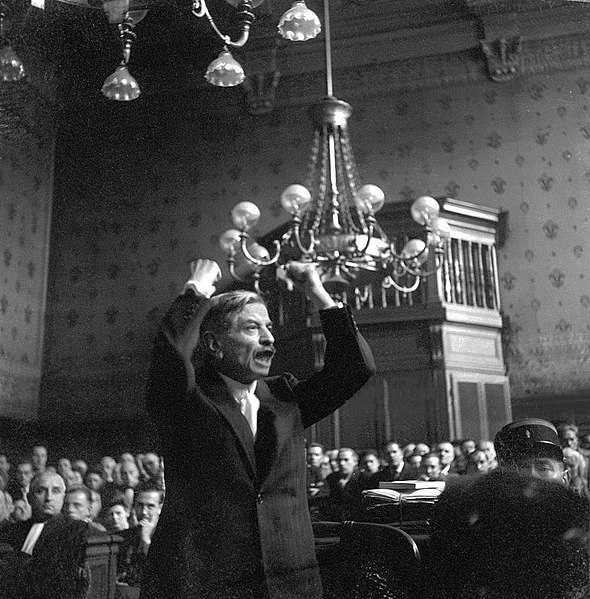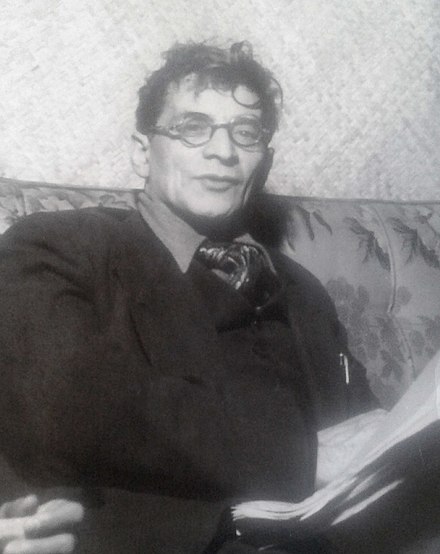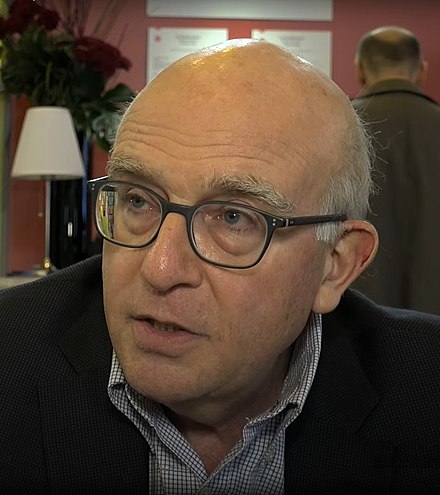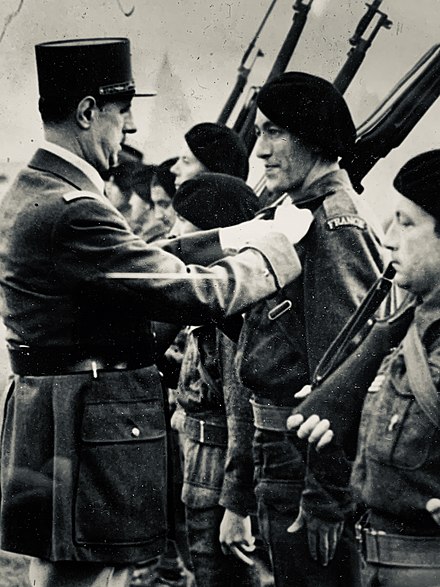Weil’s Vision for a Post-War France . . . and the Very Different France that Took Form
Christine EvansIn The Need for Roots, Weil laid out the “fundamental notions” for rebuilding France after the war, and proposed a basis for imagining a France that could shine as a beacon. To what degree were her hopes realized in the immediate post-war?
In 1943, la France combattante was establishing itself as a settled governing group; Vichy was losing credibility, recognition, adherents, and military effectiveness; the fortunes of war were turning toward the Allies. These developments gladdened the hearts of those who hoped to see Germany go down to defeat; Simone Weil, however, was increasingly locked in despondency and bitterness.[1] She was heartsick to be distant from France and her compatriots suffering under the increasing harshness of the German occupation, and was bitterly disappointed by the refusal of the London authorities to drop her into France as a clandestine operative. Her disheartenment is in part also attributable to her advancing tuberculosis. But it expresses as well, in my view, her cruel disappointment toward the post-war France being imagined and scaffolded in London and Algiers.

There was expectation early on in some Resistance circles of a thoroughgoing transformation of France. A reimagined, more just France seemed tantalizingly possible, in particular given the number of communist and socialist résistants and the thorough discrediting of the pre-war government. And this reimagining of France would not have an impact just within her borders, but in the wider world, as Weil herself had hoped. Although France should no longer presume to “think for the universe,” it still held a universal mission. “Prostrate, stretched out on the ground, still half dead, perhaps nonetheless she can try to begin once again to think about the destiny of the world. Not to decide it, because she has no authority for that. To think it through, that’s totally different.”[2] These hopes and this conviction raised the stakes for what was being deliberated in Free French circles in London – Weil and others had anticipated the possibility of laying the foundations for a France that would serve once again as a model for other peoples.
Skepticism about the possibility of a thoroughgoing change was growing in 1943, however, as blueprints for France’s future took shape. That year, a Comité general d’études questionnaire was sent out widely to Resistance circles to get feedback on the proposals being entertained. One respondent from a network in the south of France expresses the concerns of many: France’s opportunity for a fundamental reshaping is fading. None of what he has seen so far in the circulated papers gives him confidence that his own core concern will be addressed: the establishment of a “greater social justice.”[3] This writer would have found a sympathetic ear in Simone Weil. (See typescript of report on range of responses to the questionnaire.)
It is perhaps understandable that la France combattante would opt for what was recognizable, and would fall back on structures that were familiar. Its first objective was maintaining a united front in pursuit of the war and victory – all else ceded to this aim. Coming down on one side or another of important policy issues before victory, given the number of political factions and ideologies uncomfortably housed in the Free French big tent, could jeopardize that primary goal. “Disunity was regarded as the ultimate sacrilege and it was recognized that defining specific programmes – in other words making unambiguous political choices – would inevitably produce splits.”[4] Stability and order seemed a preferable option to the longer churn that more thorough-going change would require.
The New Constitution, New Political Parties, and France as an Imperial Power

In the end, the constitution of the Fourth Republic, although giving the President more decision-making authority in order to preclude the dizzying change of governments that marked the interwar period (a goal it did NOT achieve), did not differ strikingly from that of the Third Republic,[5] that constitution that, in Weil’s view, was so unloved that the French people saw it trammeled in 1940 with little emotion.[6] And although the proposals for political parties had included one for a single party growing out of resistance groups (Weil termed those who proposed this single party “fascist”[7]), what emerged was, likewise, not dramatically different from what preceded the debacle, with the Communist Party, Socialist Party and the MRP (Mouvement républicaine Populaire), to which conservative and Catholic voters flocked, standing in the first post-war elections. Vichy’s policies and initiatives were to be abrogated or dismantled out of hand, a point Weil disagreed with. She gives a fair hearing to some she considers valid: the push to revivify regional identification; the policies that aimed at re-emphasizing the importance of agrarian life and farming; the emphasis on communitarian life; the salutary study of sacred texts in schools.[8]
The issue with which she takes greatest issue is France’s continuing identity as an imperial power. Although a “federal” union between France and her colonies had at one time been among the proposals under consideration in a working group of la France combattante, with self-government by the colonies and full French citizenship for indigenous peoples, the Union française included in the Constitution of 1946 granted white minorities special representation and clearly demonstrated France’s intention to keep any part of the empire from seceding.[9] Weil had argued against granting a special role in colonial affairs to colonists given the understandable distrust toward them among the indigenous peoples.[10]

Her disappointment in some figures who were most closely allied with de Gaulle added to her disillusionment: at the last visit Maurice Schumann made to her sickbed, she refused to speak to him or accept the gift he offered – he was not “sérieux,” in her view.[11] Given the pronounced “collaborator” baiting in his Radio Londres programs broadcast to France,[12] she believed he was laying the ground for a campaign of summary justice against collaborators after the war. She saw the traps of the post-war era yawning before her beloved country. In this last instance, she was most particularly prescient.
Collaboration and meting out justice post-war
She foresaw the treatment that would be meted out to those deemed to have collaborated. If it wasn’t egregious enough to be categorized as “summary justice,” in the immediate post-war it was not far from it. The “Legal Purge” (épuration), the term given to the process of bringing “traitors” to justice at the end of the war, took place between 1945 and 1949, with the most important of the trials, those of Philippe Pétain, the head of state, and Pierre Laval, the Prime Minister during the greater part of the Occupation, taking place in 1945. She understood the longer-term strategic import of this process: the separating of the sheep from the goats, “collaborators” from “patriots.”
The speed with which General De Gaulle’s provisional government dispatched these trials was presented as a necessity: “Justice is not severe unless it is rapid.”[13] The precipitous pace of this exercise of justice (indeed one of the major critiques of the process) represented an effort to draw, as quickly as possible, a definitive line after Vichy. In the view of the provisional government, only after having buried that near past would it be possible to construct the future, and any prolonged self-examination was considered a stumbling block to that main goal.

During the war years, for example, the propaganda broadcasts of Radio Londres, an organ of la France combattante, coined the moniker “anti-France”: “France,” an innocent victim, stands out against “anti-France,” its traitorous dark double.[14] This dyad made a clear demarcation between French “patriots” and French “traitors.” This distinction was legally affirmed by a new crime that carried a new punishment. In 1944 the offense of “national indignity” was created by decree as a way to punish those who had collaborated with the occupying power. In the words of the architects of this law: “But the principle of equality before the law does not oppose the nation making a distinction between good and bad citizens. . . . ”[15] The sanctions imposed could include deprivation of civic rights, either permanently or for a limited time, a loss of professional position, the confiscation of property.
Weil foresaw and warned against the danger of assuming the “purity” of some and the “impurity” of others. Such a distinction, while perhaps reassuring in that it “quarantines” bad players, obscures the reality that degrees of complicity defined the lives of all of those who lived under occupation.

In a letter Weil wrote from New York to her friend Jean Wahl in 1942, she lays out a large number of possible motives for working with the enemy, not all of which constitute treason. She considers that she herself, as well as most other French, share some responsibility for the Occupation in their acceptance of the Armistice, which cannot be shunted off to a few “traitors”:
I don’t much like to hear people who are perfectly comfortable here treat as cowards and traitors those in France who got by as best they could in a terrible situation. It is only a small number of French for whom it’s fairly certain these adjectives might be deserved; we shouldn’t apply them beyond that number. We should only use the word traitor to designate those who one is certain desire the victory of Germany and do what they can to that end. As for the others, some of those who are willing to work with Vichy, and even with the Germans, can have honorable motives corresponding to specific situations. Others can be the object of pressure such that they could not resist without heroism. But most of those who set themselves up as judges here have never had the opportunity to test if they themselves are heroes.[16]
“Guilt,” for Weil, proves far more complex than any division of the French into two categories. Justice, and this is after all the question at hand, rests upon discriminations. Without knowing a person’s “honorable motives” or “determinate situations,” in short, without having plumbed the lived experience of those under accusation, justice goes about her task obstinately blind.
The possibility of charging someone with having worked too closely with the occupation powers put a useful tool in the hands of the new government, however. It provided the means to charge a limited number of people with traitorous acts during wartime. Those so accused and punished serve a salutary purpose: once they are identified, punished, and placed outside the comity, the nation can close ranks and rediscover unity in opposition to them. Its values, its identity are affirmed through the act of expulsion. France was able to “ . . . designate the pure and the impure in the same movement, to eliminate the bad French but also to recompose a collective identity.”[17] In this context, “purge” is a suggestive term. It implies an elimination of noxious elements, including an “impure” population, from the body politic. In addition, it implies the erasure of all that is impure from the historical memory.
Weil on the Risks of Repressing Historical Trauma

Weil had warned against the dangers posed by burying part of France’s history, even those most painful moments. For the Bretons, the Provençaux, the Corsicans, the tragedies of their present situation could be traced back to a past that was repressed and in effect stolen for reasons of state.[18] Drawing a line after trauma does not constitute healing. Henry Rousso traces the pernicious aftermath of France’s failure to come to terms with the defeat and occupation. He labels it the Vichy Syndrome.
Rousso discusses France’s “repressed trauma” in psychoanalytic terms, which he insists he is using as a metaphor, not “an explanatory system.”[19] He divides France’s post-war responses into four stages: “mourning,” “resistancialism” (“real” France during wartime as entirely aligned with the Resistance), “the return of the repressed” and “obsession.” The mourning phase directly after the war, all too perfunctory, gave way speedily to a period of “repression,” when “real” France was wholly identified with “resisting” France, which gave no opportunity for a true reckoning with the war, the divisions among the French it had uncovered and the harm the French had inflicted upon each other. In addition, large parts of the population were left out of the “hero” and “traitor” category — those who were deported, the Jews, those conscripted into forced labor for the Germans, the POWs – all erased by this “resistancialist myth.”[20]

Even the mass amnesties granted in the 1950s to those guilty of collaboration did more to cover up than reconcile; Rousso notes that the word for amnesty in French, “legal oblivion” (oubli judiciaire) empowered courts to “impose silence” on all judgments of amnesty.[21]
This teeth-clenching repression shatters during a second cycle of revelations of war crimes and trials of figures such as Paul Touvier, who, as an official of the armed militia (Milice) was responsible for number of extrajudicial killings, but who had been pardoned by President Georges Pompidou as an effort to “draw a veil” over the past.[22] In Eric Conan’s and Henry Rousso’s formulation, in this and other long-delayed trials the past “brutally erupted in the French memory.”[23]
In La Memoire, l’histoire, l’oubli (Memory, History, Forgetting) Paul Ricoeur makes no disclaimer about using psychoanalysis as a metaphor rather than an explanatory system. He lays out in psychoanalytic terms the harmful effects of forgetting on a larger community. “The first lesson of psychoanalysis is here that trauma remains even when it is inaccessible, unavailable. In its place arise substitution phenomena, symptoms that mask the return of the repressed under different guises…”[24]
Stanley Hoffmann, in his preface to the English translation of The Vichy Syndrome (1991) addresses this admonition to his American audience: “Finally, this book ought to provoke American readers into thinking about their own memories of troubled periods of their past, about evasions, myths, and distortions, and about the way in which the past never ceases to color and to disturb our behavior in the present.”[25] His reminder – or warning – is even more pertinent now than it was 30 years ago.
ENDNOTES
[1] Robert Chenavier,” Avant-propos I,” L’Enracinement, OC V, No. 2 (Paris: Gallimard, 2013), 16.
[2] “Prostrée, étendue à terre, encore à demi assomée, peut-être peut-elle quand même essayer de commencer de nouveau à penser le destin du monde. Non pas en décider, car elle n’a aucune autorité pour cela. Le penser, ce qui est tout à fait différent.” Simone Weil, “A propos de la question coloniale dans ses rapports avec le destin du peuple français,” OC V, No. 1, 295.
[3] “plus grand justice sociale””France politique. CE. Réseaux et organisations de résistance” : questionnaire relatif aux pouvoirs à mettre en place à la Libération et remarques sur ce questionnaire. 1er mars 1943 Archives du Comité d’histoire de la Deuxième Guerre mondiale — Résistance intérieure : mouvements, réseaux, partis politiques et syndicats.
[4] Andrew Shennen, Rethinking France: Plans for Renewal 1940-1946 (New York: Oxford University Press, 1989), 37.
[5] Among other provisions, the Constitution of the Fourth Republic included the following: Political parties would produce platforms so voters would choose policy rather than personalities; the Assembly was bicameral, with the senate’s power much reduced; the legislative process was reorganized to avoid the “congestion” that characterized legislation during the Third Republic; the legislature was given a larger role in regulating the economy and social programs; the executive was granted more power. Shennen, Rethinking, 138-9.
[6] Simone Weil, L’Enracinement, OC V, No. 2 (Paris: Gallimard, 2013), 257.
[7] Simone Weil, “Structure du gouvernement et création d’un parti,” OC V, No. 1 (Paris: Gallimard, 2019), 440.
[8] Some have characterized her support for some of these proposals, her unwillingness to reject as noxious all of Vichy’s policy proposals, as a collaborationist stance.
[9] Shennen, Rethinking, 166-8.
[10] Simone Weil, “A propos de la question coloniale,” 281.
[11] Robert Chenavier, “Presentation,” OC V, No. 1 (Paris: Gallimard, 2019), 48.
[12] Schumann, the spokesman for De Gaulle, was the primary voice heard in the radio program “Honneur et Patrie.” As early as 1941 he encourages his listeners in France to denounce the traitors among them by marking their houses with a “T.” And he further assures his audience that lists are being drawn up and a severe punishment awaits the miscreants. Jacques Pessis, Les Français parlent aux Français 1941-1942 (Np: Omnibus, 2011), 151.
[13] “Une justice n’est sévère que si elle est rapide.” Journal Officiel France combattante. Comité français de la libération nationale (28 août 1944) (Alger: Imprimerie officielle du gouvernement général de l’Algérie, 1944), 767. https://gallica.bnf.fr/ark:/12148/bpt6k9622107p/f3.item
[14] Jacques Pessis, ed., Les Français parlent aux Français. 1941-1942 (Np: Omnibus, 2011), 1311.
[15] “Mais le principe d’égalité devant la loi ne s’oppose pas à ce que la nation fasse le partage des bons et des mauvais citoyens…” Journal Officiel, 767.
[16] Je n’aime pas beaucoup entendre des gens parfaitement comfortable [sic] ici traiter de lâches et de traîtres ceux qui, en France, se débrouillent comme ils peuvent dans une situation terrible. Il y a un petit nombre de Français seulement pour qui il soit à peu près sûr que ces adjectifs sont mérités; on ne devrait pas les étendre au-delà… On ne devrait employer le mot de traître que pour désigner ceux dont on est certain qu’ils désirent la victoire de l’Allemagne et font ce qu’ils peuvent à cet effet. Quant aux autres, certains de ceux qui acceptent de travailler avec Vichy, et même avec les Allemands, peuvent avoir des motifs honorables répondant à des situations déterminées. D’autres peuvent être l’objet de pressions telles qu’ils ne pourraient résister sans héroïsme. Or la plupart des gens qui s’érigent en juges ici n’ont jamais eu l’occasion d’éprouver s’ils sont eux-mêmes des héros. Qtd. in Simone Pétrement, Vie de Simone Weil, Vol. II (Paris: Fayard, 1973), 445-446.
[17] “…désigner le pur et l’impur dans le même mouvement, [d]’éliminer les mauvais Français mais aussi [de] recomposer une identité collective.” Pierre Truche and Denis Salas, La Justice de l’épuration à la fin de la Second Guerre Mondiale (Paris: la Documentation française, 2008).
[18] Weil, L’Enracinement, 198-201
[19] Henry Rousso, The Vichy Syndrome, trans. Arthur Goldhammer (Cambridge, Massachusetts: Harvard UP, 1991), 11.
[20] Rousso, Vichy, 303.
[21] Rousso, Vichy, 50.
[22] Qtd. in Rousso, Vichy, 123.
[23] “brutalement resurgi dans la mémoire des Français” Eric Conan and Henry Rousso, Vichy: Un passé qui ne passe pas (Fayard: Paris, 1994), 9.
[24] La première leçon de la psychanalyse est ici que la trauma demeure même quand il est inaccessible, indisponible. A sa place surgissent des phénomènes de substitution, des symptômes qui masquent le retour du refoulé sous de guises diverses…” Paul Ricœur, La mémoire, l’histoire, l’oubli (Paris: Seuil, 2000), 576.
[25] Stanley Hoffmann, Preface to The Vichy Syndrome, x.
# # # #
The article above was excerpted from the concluding chapter of Christine Evans, The French Historical Narrative and the Fall of France: Simone Weil and Her Contemporaries Face the Debacle (Lexington Books, 2022).
5 Recommendations
